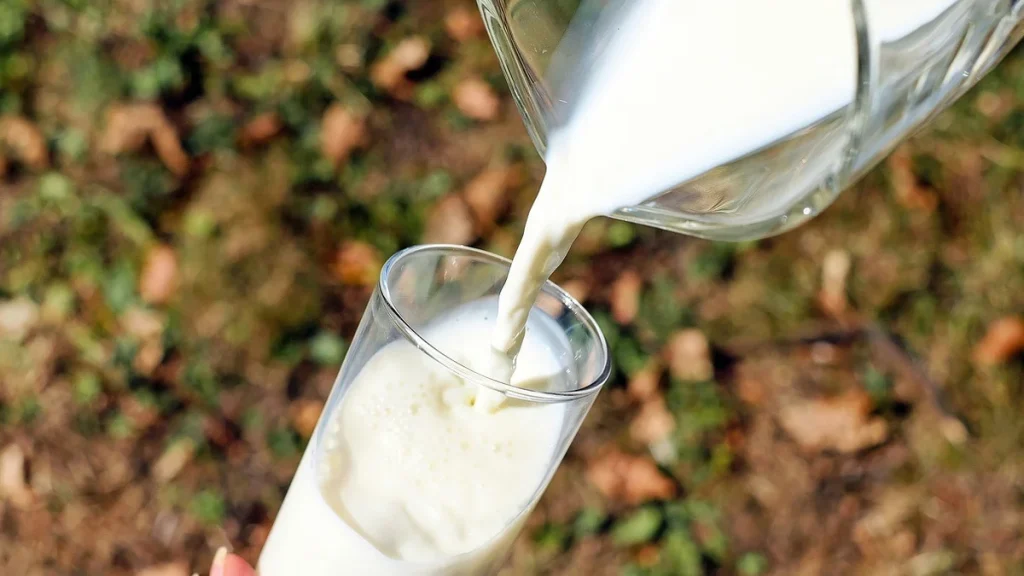- 1. Milk thistle protects your liver
- 2. It may help prevent age-related decline in brain function
- 3. Milk thistle could protect your bones
- 4. It may improve cancer treatment
- 5. It can boost breast milk production
- 6. It could help treat acne
- 7. Milk thistle can lower blood sugar levels for people with diabetes
- Is milk thistle safe?
- FAQs
7 Science-Based Benefits of Milk Thistle
Milk thistle benefits: Milk thistle may be useful in treating liver disease, cancer, and diabetes. But the evidence is limited, and some research methodologies are flawed, so it’s difficult to confirm these effects.
Milk thistle is an herbal remedy derived from the milk thistle plant, also known as Silybum marianum.
This prickly plant has distinctive purple flowers and white veins, which traditional stories say were caused by a drop of the Virgin Mary’s milk falling onto its leaves.
The active ingredients in milk thistle are a group of plant compounds collectively known as silymarin.
Its herbal remedy is known as milk thistle extract. Milk thistle extract has a high amount of silymarin that has been concentrated from the milk thistle plant.
The silymarin extracted from milk thistle is known to have antioxidant, antiviral and anti-inflammatory properties.
In fact, it has traditionally been used to treat liver and gallbladder disorders, promote breast milk production, prevent and treat cancer and even protect the liver from snake bites, alcohol and other environmental poisons.
Here are 7 science-based benefits of milk thistle.
1. Milk thistle protects your liver

7 Health Benefits of Tomatoes
Milk thistle is often promoted for its liver-protecting effects.
It’s regularly used as a complementary therapy by people who have liver damage due to conditions like alcoholic liver disease, non-alcoholic fatty liver disease, hepatitis and even liver cancer.
It’s also used to protect the liver against toxins like amatoxin, which is produced by the death cap mushroom and is deadly if ingested.
A 2021 study showed improvements in liver function in people with non-alcoholic fatty liver disease who have taken a milk thistle supplement, suggesting it could help reduce liver inflammation and liver damage.
Although more research is needed on how it works, milk thistle is thought to reduce damage to the liver caused by free radicals, which are produced when your liver metabolizes toxic substances.
One 2014 studyTrusted Source also found that it may slightly extend the life expectancy of people with cirrhosis of the liver due to alcoholic liver disease.
However, the resultsTrusted Source from studies have been mixed, and not all have found milk thistle extract to have a beneficial effect on liver disease.
Thus, more studies are needed to determine what dose and length of treatment are needed for specific liver conditions.
And although milk thistle extract is commonly used as a complementary therapy for people with liver diseases, there’s currently no evidence that it can prevent you from getting these conditions, especially if you have an unhealthy lifestyle.

Secrets to how to make a smoothie perfect every time
2. It may help prevent age-related decline in brain function
Milk thistle has been used as a traditional remedy for neurological conditions like Alzheimer’s and Parkinson’s disease for over two thousand years.
Its anti-inflammatory and antioxidant properties mean that it is possibly neuroprotective and could help prevent the decline in brain function you experience as you age.
In older animalTrusted Source studiesTrusted Source, silymarin has been shown to prevent oxidative damage to brain cells, which could help prevent mental decline.
These studies have also seen that milk thistle may be able to reduce the number of amyloid plaques in the brains of animals with Alzheimer’s disease.
Amyloid plaques are sticky clusters of amyloid proteins that can build up between nerve cells as you age.
They are seen in very high numbers in the brains of people with Alzheimer’s disease, meaning that milk thistle could potentially be used to help treat this difficult condition.
However, there are currently no human studies examining the effects of milk thistle in people with Alzheimer’s or other neurological conditions like dementia and Parkinson’s.
Moreover, it’s unclear whether milk thistle is well enough absorbed in people to allow adequate amounts to pass through the blood-brain barrier. It’s also unknown what doses would need to be prescribed for it to have a beneficial effect.
3. Milk thistle could protect your bones
Osteoporosis is a disease caused by progressive bone loss.
It usually develops slowly over a number of years and causes weak and fragile bones that break easily, even after minor falls.
Milk thistle has been shown in experimental animal studies to stimulate bone mineralization and potentially be protective against bone loss.
As a result, two 2013Trusted Source studies suggestTrusted Source that milk thistle may be a useful therapy for preventing or delaying bone loss in postmenopausal women.
However, there are currently no human studies, so its effectiveness remains unclear.
4. It may improve cancer treatment
A 2023 study found that the antioxidant effects of silymarin can stimulate anti-tumor activities as well as protect healthy cells from damage induced by chemotherapy.
A 2022 reviewTrusted Source of animal studies shows that milk thistle could be useful for reducing the side effects of cancer treatments.
It may also make chemotherapy work more effectively against certain cancers and, in some circumstances, even destroy cancer cells.
However, older studiesTrusted Source in humans are very limitedTrusted Source and have yet to show a meaningful clinical effect in people.
This may be because people aren’t able to absorb enough to get a medicinal effect.
More studies are needed before it can be determined how silymarin might be used to support people undergoing cancer treatment.
5. It can boost breast milk production
One reported effect of milk thistle is that it can boost breast milk production in lactating mothers. It’s thought to work by making more of the milk-producing hormone prolactin.
The data is very limited, but one older randomized controlled studyTrusted Source found that mothers taking 420 mg of silymarin for 63 days produced 64% more milk than those taking a placebo.
However, this is the only clinical study available. More research is needed to confirm these results and the safety of milk thistle for breastfeeding mothers.

Glow Naturally with Ginger Drink for Skin Whitening
6. It could help treat acne
Acne is a chronic inflammatory skin condition. While not dangerous, it can cause scars. People may also find it painful and worry about its effects on their appearance.
It’s been suggested that oxidative stress in the body may play a role in the development of acne.
Due to its antioxidant and anti-inflammatory effects, milk thistle may be a useful supplement for people with acne.
Interestingly, one 2012 study found that people with acne who took 210 milligrams of silymarin per day for 8 weeks experienced a 53% decrease in acne lesions.
However, as this is the only study, more high-quality research is needed.
7. Milk thistle can lower blood sugar levels for people with diabetes
Milk thistle may be a useful complementary therapy to help manage type 2 diabetes.
It’s been discovered that one of the compounds in milk thistle may work similarly to some diabetic medications by helping improve insulin sensitivity and decrease blood sugar.
In fact, the same 2021 systematic review and analysis found that people routinely taking silymarin experienced a significant reduction in their fasting blood sugar levels and HbA1c, a measure of blood sugar control.
Additionally, the antioxidant and anti-inflammatory properties of milk thistle may also be useful for reducing the risk of developing diabetic complications like kidney disease.
However, this review also noted that the quality of the studies was not very high, so more studies are needed before it’s possible to make any firm recommendations.
Is milk thistle safe?
Milk thistle is generally considered safe when taken by mouth.
When reported, side effects for milk thistle are generally gut disturbances like diarrhea, nausea or bloating.
Some people are advised to be cautious when taking milk thistle. These include:
- Pregnant women: There is no data on its safety in pregnant women, so they are usually advised to avoid this supplement.
- Those allergic to the plant: Milk thistle may cause an allergic reaction in people who are allergic to the Asteraceae/Compositae family of plants.
- People with diabetes: The blood sugar-lowering effects of milk thistle may put people with diabetes at risk of low blood sugar.
- Those with certain conditions: Milk thistle can have estrogenic effects, which may worsen hormone-sensitive conditions, including some types of breast cancer.
Does Milk Thistle Aid in Weight Loss?
Milk thistle has been cherished for centuries as a herbal remedy for various health concerns, particularly those affecting the liver and gallbladder. In recent years, it has gained popularity as a potential weight-loss aid, but scientific backing for this claim remains scarce.
Here’s an exploration of what milk thistle is and whether it might support weight loss.
What Is Milk Thistle?
Milk thistle, also known as Silybum marianum or St. Mary’s thistle, belongs to the Asteraceae family of flowering plants. This hardy herb flourishes in sunny regions across Europe, Asia, and Africa. Its defining features include a slender stem, vibrant purple blooms, spiny green leaves, and sharp thorns.
Used for centuries in traditional medicine, milk thistle is packed with compounds known for their anti-inflammatory and antioxidant properties. The most prominent of these compounds is silymarin, a mix of active substances, with silybin (or silibinin) being the most potent. These terms are often used interchangeably, though they represent distinct elements of the plant.
Modern research on milk thistle’s medicinal properties has largely focused on its role in liver health, including conditions like cirrhosis and fatty liver disease. It has also been explored as a potential therapy for managing high blood sugar in individuals with type 2 diabetes.
Does It Support Weight Loss?
While milk thistle is widely regarded for its liver-protective benefits, its role in weight management is less clear. Some proponents suggest that its antioxidant and anti-inflammatory effects could indirectly promote weight loss by improving liver function and metabolic health. However, robust scientific evidence to substantiate these claims is minimal.
Animal studies and preliminary human research hint at milk thistle’s potential to regulate blood sugar and improve insulin sensitivity, which could support weight management. But these findings are far from conclusive, and more rigorous studies are needed to establish a direct link between milk thistle and weight loss.
Dosage and Safety
Milk thistle is generally considered safe for most people when taken as directed. Reported side effects are rare but may include mild digestive issues like nausea or bloating.
For those considering milk thistle as a supplement, it’s important to note that dosage recommendations vary. Consulting a healthcare provider ensures appropriate use, particularly for individuals with pre-existing medical conditions or those taking other medications.
The Bottom Line
Milk thistle remains a celebrated herbal remedy for its liver-supportive properties and potential benefits for managing blood sugar. While it has been touted as a weight-loss aid, scientific evidence to confirm this effect is limited. If you’re exploring supplements for weight management, it’s best to pair them with a balanced diet and regular exercise—and consult a healthcare professional to find the best approach for your needs.
Limited Evidence Links Milk Thistle to Weight Loss
Milk thistle has gained some attention as a weight-loss supplement, but scientific support for its role in shedding pounds or improving body composition is sparse.
What the Research Says
A recent study explored the effects of milk thistle extract on obese mice. Interestingly, the mice treated with milk thistle lost approximately 5% of their body weight, despite consuming similar amounts of food as the untreated group. Meanwhile, the control group continued to gain weight throughout the experiment.
While this finding is intriguing, it’s important to remember that results from animal studies don’t always translate to humans.
In addition, a few small-scale human studies have assessed milk thistle’s impact on metabolic factors linked to obesity, such as insulin resistance and inflammation. However, none have specifically examined its potential to promote fat loss.
The Takeaway
Although the preliminary findings are promising, one isolated animal study isn’t enough to establish milk thistle as a reliable weight-loss aid for humans. More robust research is needed to confirm whether this herbal remedy has any meaningful impact on weight management.
Dosage and Safety Considerations
Milk thistle is commonly consumed in capsule or extract form, offering a convenient way to incorporate this herbal remedy into your routine.
Recommended Dosage
Research indicates that doses as high as 420 mg, taken three times daily, are generally well-tolerated for most individuals.
Potential Side Effects
While milk thistle has a solid safety record, it’s not entirely without risk. The most frequently reported side effects include mild digestive issues like diarrhea and nausea. In some cases, individuals may experience allergic reactions, which can manifest as headaches, itching, or joint discomfort.
If you have allergies to plants related to milk thistle—such as ragweed, daisies, or marigolds—you may be at an increased risk of adverse reactions.
Special Populations
Milk thistle is not recommended for those who are pregnant or breastfeeding due to insufficient safety data.
Interactions with Medications
At present, there’s limited research on how milk thistle might interact with prescription medications. If you’re taking any medicines, it’s wise to consult your healthcare provider before introducing milk thistle into your regimen.
By prioritizing these precautions, you can make an informed decision about incorporating milk thistle safely.
Milk Thistle Tea: Benefits, Side Effects, and Dosage
Overview
Milk thistle tea is crafted from a distinctive herb known for its milky, white-veined leaves and mild flavor reminiscent of dandelion tea. Often touted for its potential benefits, including liver support and blood sugar management, the scientific evidence for these claims remains limited.
This guide explores the essence of milk thistle tea, its active compounds, purported health benefits, and important considerations regarding dosage and safety.
What is Milk Thistle?
Milk thistle (Silybum marianum), a member of the Asteraceae family, is native to the Mediterranean region. Its hallmark features include tall stems, purple blossoms, spiny green leaves, and the white sap they exude when broken.
Known by various names—Saint Mary’s Thistle, Scotch Thistle, and Variegated Thistle—it has a long history of use for addressing liver and gallbladder concerns. Recent research has extended its potential applications to neurodegenerative conditions, cancer, diabetes, and cardiovascular health.
Milk thistle is commonly available in various forms, such as capsules, tablets, liquid extracts, and teas. Its seeds, sometimes accompanied by leaves, are the primary source for these preparations.
Active Compounds
The key compound in milk thistle is silymarin, with its most potent component being silybin (or silibinin). While silymarin is present in the plant’s flowers and leaves, it’s most concentrated in its seeds.
Silymarin’s antioxidant properties are believed to neutralize harmful free radicals, reducing cell damage and inflammation. However, as milk thistle tea often uses ground or whole seeds, it provides only modest amounts of silymarin compared to concentrated extracts.
Since silymarin is poorly absorbed and not water-soluble, tea may not be the most effective way to harness the compound’s full potential.
Potential Benefits
1. Liver Health
Milk thistle’s liver-protective properties are its most studied benefit. Research suggests it may assist in managing conditions like:
- Viral hepatitis
- Alcohol-induced liver damage
- Non-alcoholic fatty liver disease
- Drug or toxin-related liver injury
Silymarin’s anti-inflammatory and antioxidant effects are thought to combat free radicals produced during liver metabolism. For example, a 2014 review indicated that silymarin might improve life expectancy in those with alcohol-induced cirrhosis. However, additional research is needed to establish the efficacy and safety of tea preparations for liver health.
2. Diabetes Management
Milk thistle is under investigation for its anti-diabetic properties. A 2016 review found that silymarin supplements helped lower fasting blood sugar levels. These effects may stem from improved insulin sensitivity and reduced inflammation linked to diabetes.
Although promising, most studies have used concentrated extracts rather than tea, so more robust trials are needed to confirm these benefits.
3. Cancer Management
Preliminary findings suggest that silymarin extract may possess anti-cancer properties, potentially slowing cell division and reproduction. However, most of these observations come from laboratory studies, not clinical trials, necessitating further investigation.
Dosage and Side Effects
There is no universal dosage for milk thistle tea, but it is generally safe when consumed in moderation. Commercial milk thistle supplements typically range between 250–750 mg and are taken 2–3 times daily.
Side Effects
The most common side effects include mild digestive issues, such as nausea or diarrhea. Some individuals may also experience allergic reactions, including headaches, itching, or joint discomfort.
Precautions
1. Pregnancy and Breastfeeding
Due to insufficient research, pregnant or breastfeeding individuals should consult a healthcare provider before consuming milk thistle tea.
2. Hormone-Sensitive Conditions
Milk thistle should be avoided by individuals with hormone-sensitive conditions, such as breast, uterine, or ovarian cancers, as well as endometriosis or fibroids.
3. Medication Interactions
Milk thistle may interact with medications like:
- Blood thinners (e.g., warfarin)
- HIV treatments (e.g., indinavir, saquinavir)
- Chemotherapy agents
- Calcium channel blockers
- Certain antibiotics
If you are on any of these medications, it’s best to avoid milk thistle without medical advice.
4. Allergies
Those with allergies to plants like ragweed, daisies, marigolds, or chrysanthemums should exercise caution, as cross-reactivity may occur.
Conclusion
While milk thistle tea is a soothing herbal beverage with a rich history, its benefits are less pronounced compared to concentrated extracts. If you’re considering incorporating it into your wellness routine, consult a healthcare provider to ensure it’s safe for your unique needs.
FAQs
What Is Taking Milk Thistle Good For?
Milk thistle, a herbal remedy derived from the plant Silybum marianum, is primarily used for its liver-supporting properties. Its active ingredient, silymarin, is known for its antioxidant, anti-inflammatory, and detoxifying effects. Common benefits include:
- Liver Health: Protects liver cells from damage, supports detoxification, and may help manage conditions like cirrhosis, hepatitis, and fatty liver.
- Blood Sugar Control: May help regulate blood sugar levels in people with type 2 diabetes.
- Cholesterol Management: Shows potential in improving cholesterol profiles.
- Skin Health: Has anti-inflammatory properties that may benefit certain skin conditions.
- Digestive Support: Helps alleviate indigestion and symptoms of dyspepsia.
Can Milk Thistle Cure Fatty Liver?
Milk thistle is not a cure for fatty liver disease, but it may help manage and improve the condition. Studies suggest silymarin might reduce liver inflammation and oxidative stress, both of which contribute to fatty liver. It may also improve liver enzyme levels, indicating better liver function. However, the best approach to managing fatty liver involves lifestyle changes, such as:
- Eating a healthy, balanced diet.
- Reducing alcohol intake.
- Increasing physical activity.
Who Should Avoid Milk Thistle?
Milk thistle is generally safe for most people, but certain individuals should avoid it:
- People with Allergies: Those allergic to ragweed, daisies, marigolds, or chrysanthemums may experience allergic reactions.
- Pregnant or Breastfeeding Women: Safety in these groups is not well-studied.
- Individuals with Hormone-Sensitive Conditions: Conditions like breast cancer or uterine fibroids could be exacerbated as milk thistle may act like estrogen.
- Those Taking Certain Medications: Milk thistle might interact with blood thinners, diabetes medications, and drugs metabolized by the liver.
Is Milk Thistle Bad for Kidneys?
Milk thistle is not inherently bad for the kidneys. Its antioxidant properties may help protect kidney cells from damage caused by toxins and oxidative stress. However, it should be used cautiously if you have kidney disease, and always under the guidance of a healthcare provider.
Does Milk Thistle Flush the Liver?
Milk thistle supports the liver’s natural detoxification processes rather than “flushing” the liver in the literal sense. Silymarin stimulates the regeneration of liver cells and helps remove toxins. However, the liver is naturally self-cleansing, and milk thistle simply enhances this function.






